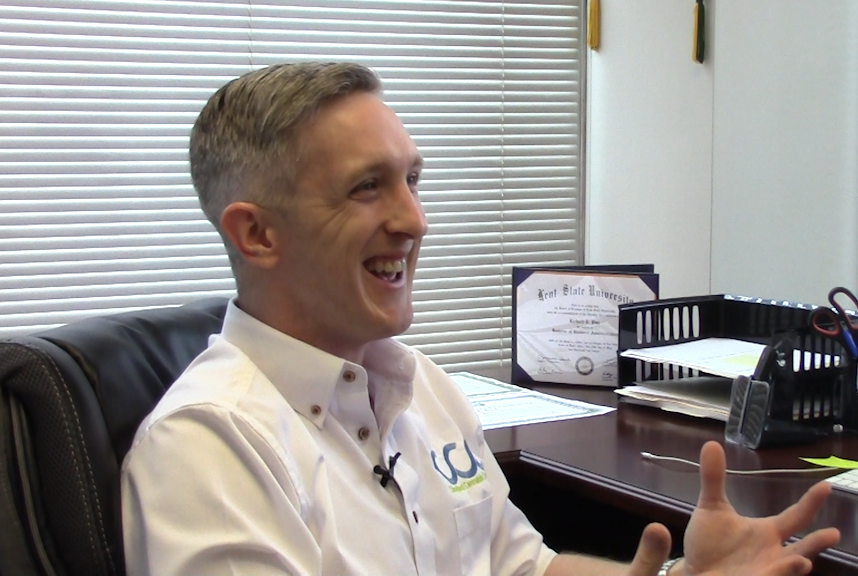Alum founds state’s first medical marijuana school
(SCREENSHOT) Richard Pine, Kent State alumnus and founder of Cleveland Cannabis College, located in Independence, Ohio.
At the age of 16, Richard Pine was in a car accident. To help ease the discomfort of injuries sustained in the crash, Pine’s doctors prescribed him various pain medications and muscle relaxers. While the pills were intended to help during recovery, he found another medication that he preferred.
“Using cannabis always helped with the pain better,” Pine said. “And I never got the groggy, drug feeling that all the pills gave me. And later, I pretty much found out that I was self-medicating with cannabis. I just preferred that over medication.”
The 28-year-old Kent State alumnus used his experience as motivation to create the Cleveland Cannabis College, Ohio’s first medical marijuana education provider. Not long after graduating in 2012 with a bachelor’s degree in business administration, Pine began research on the medical benefits of the cannabis plant.
CCC and Irvin from KentWired.com and Raven Fulton and Jake Young on Vimeo.
After Ohio passed House Bill 523 last September — legalizing medical marijuana statewide — he found an opportunity to reach out to fellow Ohioans through the college.
“In order to make this medication safely and effective and available, there needs to be a strong base for education,” Pine said. “Also, with Ohio requiring the ongoing education for physicians and for a lot of the people who hold licenses — growers, processors and dispensaries — the state is requiring ongoing education for employees. So we saw that there was this niche that we could get into to make sure we were providing the best cannabis related education anywhere.”
Cleveland Cannabis College classes began the last week of January. Pine said 70 students have enrolled and taken the required course “Intro to Medical Cannabis.” After passing the preliminary class, students can choose from three majors: cannabis horticulture, cannabis business or medical applications of cannabis.
The college’s first semester starts this coming June.
“We have 28 (students) so far for the first semester,” Pine said. “We’re only accepting 40. We only accept between 20 to 22 students for our intro classes because we believe that … it allows them to open up. It allows them for a much more open flow of information.”
He said that the school has a diverse student body. Recent high school graduates, nurses and individuals seeking an alternative to higher learning have all found an education at the medical marijuana school.
“We get so many different type of people, young to old,” admissions director Donelle Watson said. “A lot of them are coming in like ‘Oh, I didn’t know this place existed’ when they first come in. (They say) ‘I just wanna make sure you guys are legit or real’ … There’s such a big opiate crisis in Ohio. (Marijuana) is medicine and people need the proper education to know how to properly use it.”
Pine’s own father, a retired surgeon, has even attended the college’s introductory course. He said his father, who “can lay someone on his table, cut (people) open and put their heart back together,” never received a formal education on the benefits of the cannabis plant.
While Pine said his parents are supportive of the school, he cites his father’s lack of education about the medical marijuana industry as reason to inform the public.
Ultimately, Pine wishes to decrease the stigma attached to marijuana. From his own experience, he knows that the plant can only benefit society.
“Using medical cannabis can treat and cure a lot of different diseases. Is it a cure-all? No, not by any means,” Pine said. “Could it work with and replace a lot of more harmful medications? Absolutely … the importance is getting this medication to patients that absolutely need it.”
McKenzie Jean-Philippe is the diversity editor, contact her at [email protected].



